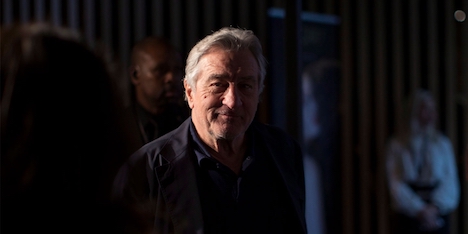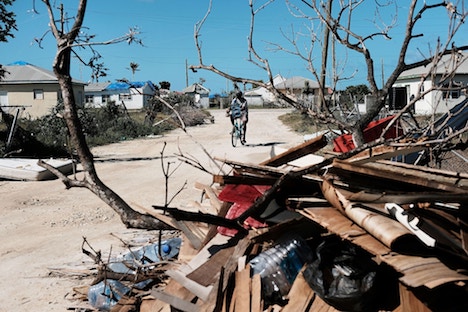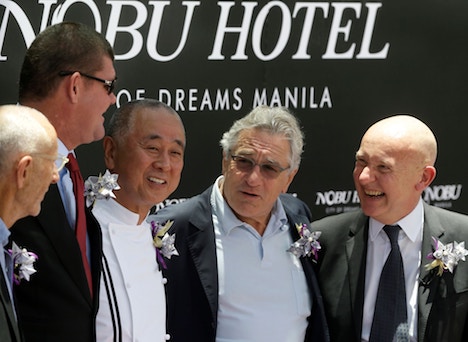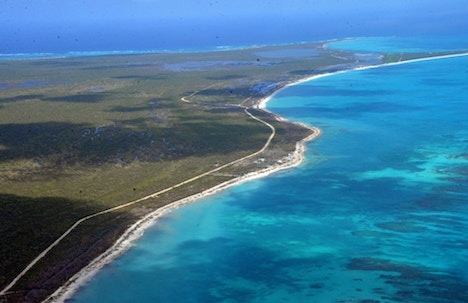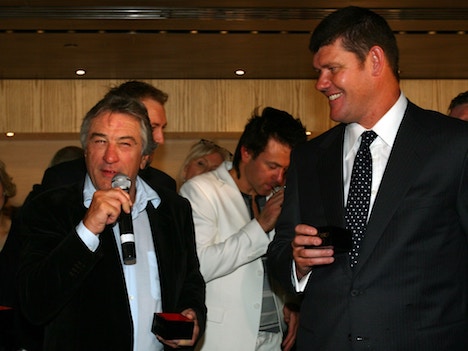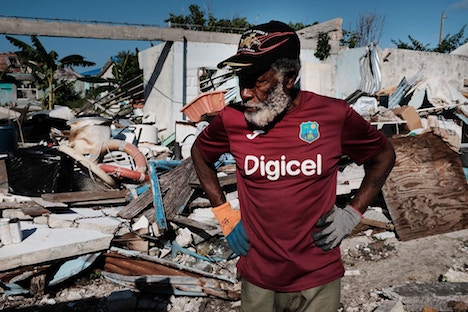A CHORUS OF VOICES from the Caribbean island of Barbuda is accusing Robert De Niro of being part of a backroom effort to exploit a devastating hurricane to fundamentally change the island’s communal land ownership law in the interest of developers — changes opposed by many Barbudans, but which could aid the actor’s controversial plans to build a large luxury resort called Paradise Found Nobu. Earlier this month, with almost no international news coverage and with the majority of Barbudans still displaced from the storm, an amendment to the law in question was quietly pushed through the Senate of Antigua and Barbuda — a body dominated by politicians from the wealthier and more populous island of Antigua. If the amendment stands, a tradition of communal land rights that dates back to the abolition of slavery in 1834 — and which has protected Barbuda as a rare beacon of sustainable development in the Caribbean — will be extinguished. But as news of the change trickles out, Barbudans are fighting back, challenging the legality of the amendment to the Barbuda Land Act. And they say the island’s highest-profile investor, Robert De Niro, stands to benefit most. “It’s just a scam to take away the land from the Barbudans so they can give it to people like Robert de Niro,” said Mackenzie Frank, a former senator from the island. “Anyone who has beach land is laughing all the way to the bank.” De Niro, who has so far stayed silent as the controversy has grown, did not respond to The Intercept’s requests for comment. Up until the recent changes, land in Barbuda was held in common: It could not be bought or sold, and though developers could lease land for 50 years, their projects needed to win the consent of a majority of Barbudans. It was a rare example of participatory economic planning and successful land redistribution to freed slaves and their descendants. But the Land Act was resented by foreign investors and wealthy Antiguans, and the latest push to alter the law first reared its head just days after Hurricane Irma roared through Barbuda. The island had been hit by storms before, but never like this: Upwards of 90 percent of the buildings in Barbuda were damaged, and all residents were evacuated to Antigua.
When they heard about the proposed changes to the Land Act, many Barbudans (including those living in the diaspora) objected — but it was nearly impossible for them to organize effective opposition. As Tim George, a U.K. citizen whose mother is Barbudan, observed weeks after the storm, “An entire population is now housed in temporary shelter, reliant on the authorities for everything, and restricted in their access to their homes. By allowing an opportunistic Antiguan government the momentum to force this change past a traumatised community in its most vulnerable moment, the core freedom secured by those emancipated from slavery, successfully defended and passed down through generations, is under serious threat.” Ayana Elizabeth Johnson, a marine biologist and ocean conservationist who worked in Barbuda for years, describes the attempted changes a “land grab” and “a wild episode of disaster capitalism.” To many outsiders, the role De Niro played in this period seemed benign, if not downright heroic. In the weeks after Irma hit, he appeared at the United Nations and on cable news, pledging to personally help with Barbuda’s reconstruction and urging governments and international agencies to pony up aid and stand with the “vulnerable.” In interviews, De Niro did mention that he had a hotel project in development on the island, but only to explain his particular compassion for the people there. The facts paint a more complex picture. Though best known for acting and producing (as well as founding the Tribeca Film Festival), De Niro has also emerged as a highly successful real estate mogul, accumulating a rapidly expanding empire of elite properties. As co-owner of Nobu Hospitality, De Niro helped turn a celebrated Japanese eatery in Beverly Hills into a chain of dozens of restaurants around the world, as well as a growing roster of luxury condos and hotels.
FOR THE MOST PART, Nobu’s expansion has focused on cities, but in recent years, De Niro has had his sights set on an ambitious project on Barbuda, which has a population of approximately 1,800. In 2014, the actor partnered with the Australian billionaire bad boy James Packer (best known for his messy break-up with singer Mariah Carey) to develop an exclusive hotel there. They bought out the lease on a derelict resort that, in its heyday, had been Princess Diana’s favorite family beach destination. Attracted to the island’s unspoiled white beaches, shallow turquoise waters, and slow pace, De Niro and Packer unveiled plans to significantly expand the property and rebrand it as “Paradise Found Nobu.” Packer has also not responded to a request for comment. But there were limits to how big and how lavish the resort could be. That’s because Barbuda’s unique and democratic collective land ownership structure keeps the pace of development in check. As explained in this New York Times documentary, the island runs “like a co-op,” with decisions about land use driven by an elected council, and approvals for major developments going to a general vote. Many of its inhabitants raise livestock or fish for lobster to support themselves. “Life in Barbuda, it is slow, it is quiet, it is restful, it’s peaceful,” 25-year-old Kendra Beazer, the youngest member of the Barbuda Council, told The Intercept. In contrast, the other half of the twin-island nation, Antigua, has flung itself open to mega resorts and heavy cruise ship traffic (as well as financial services). Seeing further opportunity in Barbuda’s pristine beaches and abundant fisheries, the Antiguan-dominated government – which has strong ties to real estate and banking — has long fought to end the tradition of communal land rights on Barbuda. Casting this pressure as an attack on hard-won victories after the abolition of slavery, Barbudans convinced legislators in 2007 to cement in law the practices they had followed for hundreds of years. The Barbuda Land Act underlined that “all land in Barbuda shall be owned in common by the people of Barbuda,” and “no land in Barbuda shall be sold.” All of this has kept the vast majority of the island in the hands of families directly descended from slaves — a remarkable achievement. It has also kept tourism and most other development at a sustainable level, which is the reason Barbuda remained a “paradise” to be “found” by men like De Niro and Packer in the first place. But for investors with big dreams, the Barbuda Land Act was also highly inconvenient. It placed limits on the length of their leases, the footprint of their properties, and the infrastructure that could service them. It also required a great deal of democratic engagement with the island’s residents, as opposed to the usual top-down deals. De Niro and Packer have not navigated this landscape well, choosing instead to try winning exceptions to the Land Act from the Antigua-based government of Prime Minister Gaston Browne, a former banker who consistently casts Barbuda as a “welfare island.” De Niro has found a fierce ally in Browne. Months before the Barbudan approval process could even begin, the prime minister signed a memorandum of agreement with the actor, promising a 198-year lease of 555 acres for just $6.2 million, plus an array of tax benefits. He went further, dubbing De Niro an official “economic envoy” of Antigua and Barbuda. This approach has not gone over well with many Barbudans, who see it as railroading their democratic rules. It’s a conflict that has landed De Niro and Packer in a protracted legal mess, with hundreds of Barbudans signing a petition against their plans for Paradise Found. Members of the political party Barbuda People’s Movement sued the project, arguing that the referendum approving it illegally allowed non-Barbudans to vote and failed to anonymize the ballots. Browne responded to these challenges by going to war for De Niro. “Those who may intend to become economic terrorists in this country,” he said in March 2015, referring to project opponents, “they would have to face the full extent of the law for any infractions whatsoever.” Months later, his government went so far as to pass the Paradise Found Act, specially designed to approve De Niro’s project and bypass the Barbuda Land Act with its collective approval requirements. Just for Paradise Found, the act explicitly nullifies the community approval sections of the Barbuda Land Act. It also grants the project permission to build its own television service, renewable energy, and desalinization plants, “for the sole purpose of the Project,” as well as infrastructure for “large and super yachts” and a helipad. Members of the Barbuda People’s Movement once again challenged the Paradise Found Act, wary that this one development was a harbinger of a future for their island that would be all about catering to the global yacht-owning set. (Indeed several other high-end developers have pursued similar projects, including John Paul DeJoria, the billionaire creator of Paul Mitchell hair products and Patron tequila, and Peter Virdee, a British real estate developer and solar energy investor, who was arrested last year for allegedly leading a carbon credit fraud scheme.) It did not escape their notice that buried in Browne’s memorandum of agreement with De Niro was a troubling clause, stating that should Barbudan land become available to own privately at any point in the future, the government of Antigua and Barbuda would “facilitate the immediate conversion” of leased Barbudan land to private title. At the time, changing the law didn’t seem politically feasible. But then came Hurricane Irma — and those troublesome Barbudans were literally swept out of the way. As Rodney Williams, Barbuda’s governor general, memorably told the U.N. last September, “For the first time in over 300 years, there is today not a single human being living on Barbuda.”
SHORTLY AFTER THE storm, Browne declared the island unfit for habitation. Eventually, the prime minister began to allow small groups of islanders to return to Barbuda for a few hours each day to pick up their lives before getting back on the two-hour ferry to Antigua. But it would be three weeks after the storm before the mandatory evacuation order was lifted. To this day, Barbuda remains without power or running water. Only around 400 people have returned, in part because the schools have not reopened, leaving families with children stuck in Antigua, many still in temporary shelters. Although a state of emergency expired in October, the military never left. Now many are asking why — despite an outpouring of aid — reconstruction has been so slow. According to John Mussington, a Barbudan school principal and co-founder of the group Barbuda Silent No More, livelihoods collapsed in the weeks that went by before people could return. Homes filled with mold, chickens were attacked by stray dogs, pigs trampled gardens. “The economy in Barbuda was destroyed,” he said in an interview. With Barbuda empty and its people’s means of saving money dramatically eroded, Browne made his move. Less than a week after Irma hit, he announced a plan to allow Barbudans to buy property rights to their own land for $1 per plot, casting it as a crucial form of post-disaster relief. According to Browne, the selloff would allow Barbudans to obtain loans that he said they couldn’t access without a deed as collateral. “They can go into the bank, they can borrow money, they can repair their properties, they can get a mortgage, they can build,” he said. Browne has made no secret of the fact that he sees the storm as more than a tragedy. “We are saddened by the extent of the damage,” the prime minister said in an interview with the New York Times, “but there are opportunities to be exploited.” Many Barbudans — those displaced to Antigua and those living in the diaspora in places like New York and Toronto — have spoken out against Browne’s definition of “opportunities” and insisted that this was no time to attack centuries-old land rights. But like all disaster-struck people, they were also focused on immediately pressing emergencies: When would they be able to access their homes? When would the lights come back on? When would the schools reopen? It was in this context that, on December 12, a sweeping 13-page “amendment” to the hard-won Barbuda Land Act was officially introduced in Antigua and Barbuda’s House of Representatives. It includes changes that entirely reverse the meaning of the law. In the amendment, a clause declaring Barbuda “owned in common by the people of Barbuda” was deleted and replaced. “The fundamental purpose of the Act is to grant to Barbudans the right to purchase the [land],” the amended act reads. Browne has said that the law would restrict ownership to Barbudans — and only if they choose to buy. But by allowing land to be sold at all, the communal land ownership structure is being fundamentally changed, and many see a slippery slope. Moreover, once land has been purchased, it can then be leased to foreign developers without a democratic process. To add salt to the wound, the amendment also altered the definition of a Barbudan, eliminating those whose grandparents lived on the island. With the law’s passage, a swath of the Barbudan diaspora’s claims to the land were erased. Significantly, a section titled “Leases for major development” states that while investors can apply to the Barbuda Council for leases, the Cabinet of Antigua and Barbuda can also grant leases on its own, after mere “consultation” with the Barbuda Council — and there is no mention whatsoever of the Barbudan population voting or participating in decisions to grant leases, effectively erasing their participatory democracy. It also states these leases can be handed out for periods longer than 50 years “as the Cabinet may deem fit.” In short, these radical changes would retroactively enshrine in law a version of what Gaston Browne attempted to do — against the legal objections of many Barbudans — for Paradise Found. De Niro and Packer’s property is specifically named at the end of the amendment, making it explicit that it is covered by these new business-friendly rules. Sections of the previous version of the law, meanwhile, are declared “unconstitutional” and therefore repealed. All of which means that turning Paradise Found into a reality — including those parts of the project that many Barbudans objected to — appears to have gotten significantly less complicated and potentially more profitable. Members of Barbuda Silent No More filed a request for an injunction, calling the amendment illegal. “The law in Antigua and Barbuda specifically states that the Barbuda Land Act and the communal land rights it protects cannot be changed without the consent of the Barbudan people,” attorney Leslie Thomas said in a statement. But a judge denied the injunction, and this month, the amendment to the land law was approved — it now awaits only the signature of the governor general. Many Barbudans have pledged to continue fighting, despite the difficulties organizing a disaster-struck people. “You just do not get the kind of reaction that you would normally have if this was going on under any other circumstance,” Mussington said. “It was done deliberately and while Barbudans were traumatized, while they were kept away from their homes, while they were scattered, suffering post-traumatic stress.”
And he insists that developers like De Niro share the blame. “Whoever are the beneficiaries of Paradise Found, they have to bear the responsibility of what is happening to us in Barbuda.” Mussington added, “You are coming into someone’s territory and there are laws and regulations, which govern how you should operate. You do not like these laws, so you ignore them. You go even further and change those laws to suit yourself. Your actions therefore demonstrate that you have elevated yourself above the people you are dealing with.” Asha Frank, a member of the Barbuda Council, puts it in starker terms: “You can’t just expect you can go somewhere and then decide ‘this is how I want to do it — it doesn’t matter who’s there, this is how I’m going to do it.’ It’s neocolonialism.” Of course, Barbudans are not unanimous in their criticisms of the concessions granted to Paradise Found, an issue over which the Barbuda Council has been divided. Even those who have objected to the efforts to bypass Barbuda’s democratic process are quick to explain that they do not oppose Paradise Found entirely, nor are they anti-tourism. As council member Kendra Beazer said, “We want that type of development on Barbuda in terms of [De Niro’s] reputation and recognition worldwide. However, he needs to respect the Barbudans and their way of life and work with us.” There are painful historical echoes in this series of events. Barbuda’s history is sparsely documented, but according to residents, the special land law has its roots in 1834, when a pitched conflict erupted in response to an attempt to forcibly relocate newly emancipated slaves in Barbuda to plantations in Antigua so that a slave owner, Sir Christopher Bethell-Codrington, could collect compensation for his lost “property” from the British Crown. The Barbudan slaves refused to move, preferring to stay on the land and waters where they had long raised animals, farmed, and fished. After a failed attempt to quash the resistance by British forces, the freed slaves eventually gained control over the land on their island, leaving Codrington to gripe that “Negro emancipation seems to have made the Proprietor the Slave. The former will reside on my Property and have daily wages whether I have work for them or not.” Indeed, on the land where they had been slaves, Barbudans created a democratic, communal ownership structure, which they have fiercely protected for almost two centuries. As former senator Mackenzie Frank put it, “It was born in the bowels of slavery and continued to grow in the post-emancipation world.” Now, with the help of Hurricane Irma, Gaston Browne seems to have pulled off what Barbuda’s former colonial masters could not: He relocated hundreds of Barbudans to Antigua and proceeded to strip them of their communal land rights. Meanwhile, the pro-corporate makeover of Barbuda that politicians like Browne have long dreamed of is speeding ahead. With homes still destroyed and the primary school sitting without a roof, construction of a new international airport is advancing. Before the storm, Paradise Found reportedly put up some of the funding for the airport since it is needed for the elite resort to move forward. Days after the Barbuda Land Act amendment passed, the Clinton Foundation and the Rocky Mountain Institute announced “a new effort to redesign Barbuda’s power sector and to shift to a renewable energy model.” Council members say they were not consulted. Browne’s office did not respond to a request for comment.
FOR NOW, THE steep inequalities that are a fact of life nearly everywhere on earth do not exist on Barbuda. The ocean provides food security, and any Barbudan can claim occupancy of beachfront property. “You don’t have homeless persons, you don’t have persons starving because of their inability to sustain themselves,” John Mussington said. All of that, he predicts, is now at risk. “When anyone can purchase land, and especially when you’re going into luxury homes and these real estate ventures — what happens to property prices? They skyrocket. Pretty soon land will not be within the reach of the average Barbudans.” He says that mortgages will lead to foreclosures, and banks will likely end up selling to non-Barbudans. Kendra Beazer agrees. “I believe in my heart that this will change what was Barbudan completely, because the whole notion of us owning this precious island in common is no longer the case,” he said. “We will no longer be entitled to a plot by just seeing it and being able to build for our family, build our life, on that plot of land.” To Mussington, De Niro is a brand, a face that stands for an array of wealthy investors who fail to carefully consider the lives of Barbudans before staking a claim to their paradise. “Such investors get their hands on virgin land, cheap or at no price. They then turn around and sell these lands as luxury properties for the rich and famous and make a quick profit with huge returns,” he said. “Getting a big name attached to your venture is seen as a way of selling to the clientele.” Tim George, the U.K. citizen, added, “Robert De Niro has a direct responsibility to grasp Barbudan culture and tradition. However, while Gaston Brown does the dirty work on Barbuda, De Niro has chosen silence as if waiting to benefit most from a paradise lost.” When Robert De Niro spoke at the United Nations in the immediate aftermath of Hurricane Irma, he told the audience, “We must act together to help the most vulnerable. The recovery process will be a long, hard road. Barbudans must be a part of it.” Barbudans, with their long and deep tradition of participatory democracy, believe they should be part of it, too. Which is why many are now calling on De Niro to change course and stand with them as they challenge a radical change to their land rights that they consider illegal. In her letter sent to De Niro’s office last week, the marine biologist Ayana Elizabeth Johnson wrote: “If Mr. De Niro expresses support for Barbudans’ will to maintain their communal land ownership, that could make all the difference, and his resort project could still proceed, just requiring the consent of the community. If he does not speak up, he could become the next iconic face of a white man increasing his personal wealth on the backs of people of color.” In so many cases after major disasters strike, survivors fight for the right to rebuild in ways that are fairer and more sustainable than the pre-disaster status quo — with greater food and housing security, with economic development focused on people’s needs as opposed to investor wish lists, and with the power to fully participate in the decisions that will greatly impact their futures. Those have been the core demands of movements calling for a “just recovery,” from Puerto Rico and Houston today to New Orleans after Hurricane Katrina. The bitter irony is that Barbudans — with their participatory democracy and careful land use practices — had all of these rights before disaster struck. And now, dispersed from their homes after Irma, they are in the midst of losing them. Source URL |
